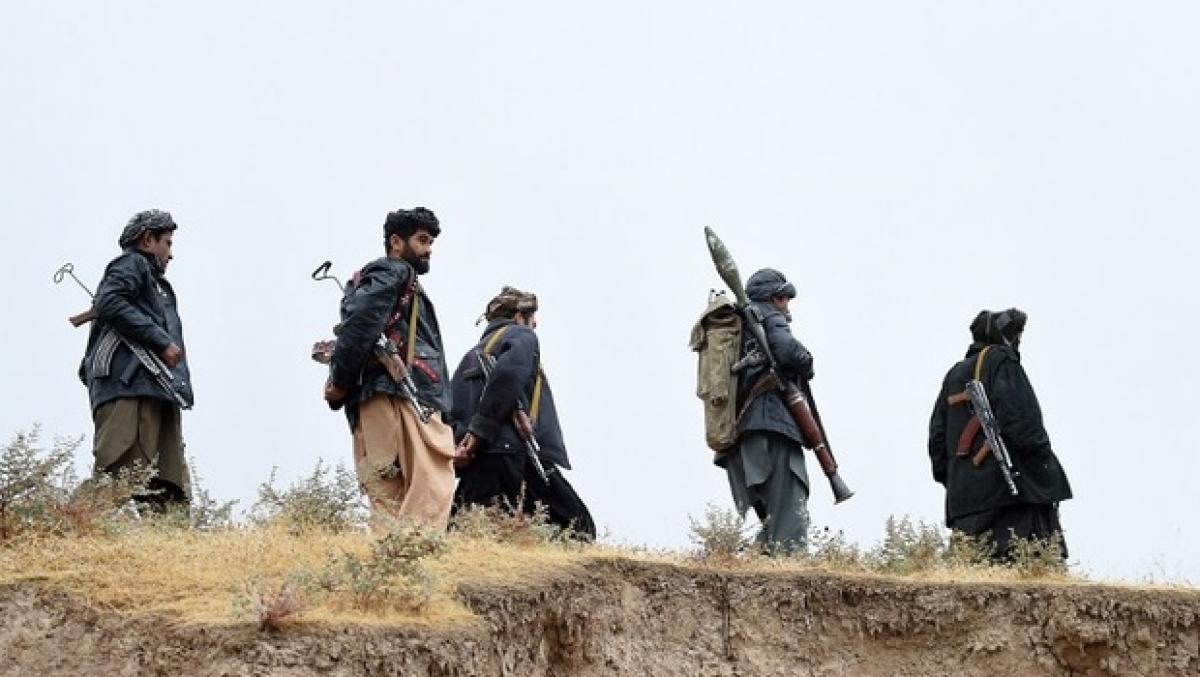Live
- Decades-old temple re-opens after 46 years in Sambhal
- Aaditya Thackeray Calls For EOW Probe Into Mumbai's Rs 7,000 Crore Road Project
- Omar Abdullah Urges Congress To Earn INDIA Bloc Leadership Role
- Yogi Adityanath Contrasts Historical And Modern Treatment Of Workers In India
- Historic Temple In Sambhal Reopens After 46-Year Closure Following 1978 Riots
- Officials directed to work for deeper reach of guarantees
- Delay In 'One Nation, One Election' Bills Introduction Announced
- Exhilarating ‘Benchmark’ of Venkat Changavalli
- Development activities worth `30 cr launched in Puthalapattu constituency
- Allegations against KTR baseless: BRS leader
Just In

The Government of Pakistan may have vowed to go after militants across the country with a vengeance, and announced several initiatives and operations to meet this goal, but the fact remains that militants continue to move around freely across the length and breadth of the country.
The Government of Pakistan may have vowed to go after militants across the country with a vengeance, and announced several initiatives and operations to meet this goal, but the fact remains that militants continue to move around freely across the length and breadth of the country.
Despite Islamabad maintaining before the international community that it is waging a concerted campaign against all militants, the Wall Street Journal (WSJ) has in a report quoted experts and critics of the Sharif regime, as saying that both the military and the madrassas are offering shelter to what they call "useful" jihadists.
The WSJ report cites the experts, as saying that madrassas in the less-developed south of Punjab, districts like Bahawalpur, Multan and Dera Ghazi Khan, serve as a nursery for jihadist groups by teaching the hard-line Deobandi version of Islam, a puritan Sunni movement that is followed by the Pakistani Taliban and most other militant groups.
To back this claim, the report says the banned extremist group Jaish-e-Mohammad (JeM) is constructing a new madrassa on a 10-acre plot of land located off the highway on the outskirts of Bahalwalpur town.
It quoted a JeM cleric, as saying, "We don't hide who we are. We are a jihadist group."
Over the past two years, Pakistan's armed forces have tackled jihadists, especially the Pakistani Taliban, in the northwestern tribal areas and the southwestern province of Balochistan. Both areas border Afghanistan, where officials believe Pakistani Taliban leaders are based. Clean-up operations are reportedly also taking place in Karachi, but according to the WSJ, the group is extending its reach.
Punjab province, which Prime Minister Nawaz Sharif's home base, has, according to the WSJ, has seen a far more low-key approach to fighting extremists, and according to Riaz Husain Pirzada, minister of federal-provincial coordination and a member of parliament from Bahawalpur, security operations are only launched against those outfits that attack the police or the army.
Pirzada further goes to claim that the breeding grounds for militants i.e. the madrassas are still being financed.
It's another matter that Punjab is home to more than half of Pakistan's 182.1 million strong population (2013 figures).
Though there is recognition that both the Lashkar-e-Taiba and Jaish-e-Mohammad represent real risks to Pakistan itself, the WSJ quotes an unnamed western diplomat, as saying that no one really has clarity on how to address this challenge.
For instance, incidents like the terror strike on an Indian Air Force (IAF) base in Pathankot on the Indian side of Punjab in January this year. The gun battle and the subsequent combing operation lasted about 17 hours and resulted in the deaths of five terrorists and three security personnel. What has followed in its wake is New Delhi giving leads and proof and Islamabad undertaking an investigation on the surface for public consumption and declaring the findings of the former as farcical.
Pakistan has also being doing a flip-flop over what it is doing with the JeM and its founder Masood Azhar, sometimes saying it has sealed the offices of the Jaish, or saying that it has placed Azhar in protective custody, and later going into a state of denial about his detention.
Then, there is the incident of a suicide bomber killing more than 70 Christians on Easter Sunday in Lahore's Gulshan Park, leading the government to make the cliched vow of going after Islamist militants in the area. The responsibility for the massacre was claimed by a faction of the Pakistani Taliban, which has long been a major target of the security forces. But simultaneously, we see another outlawed extremist group, with ties to al Qaeda, operating openly in this city of 600,000, which is the headquarters of the Pakistan Army's XXXI Corps.
Last month, Pakistan's close ally China blocked India's bid to have Masood Azhar listed as a terrorist at the U.N. Security Council, leading to a perceived strain in bilateral ties between New Delhi and Beijing. Now, we hear the latter suggesting to the former to discuss and sort out differences on the issue bilaterally with Islamabad.
Rana Sanaullah, Punjab province's law minister, said in an interview that Jaish "isn't involved in terrorism in Pakistan." He said he hadn't seen any evidence from India to implicate Mr. Azhar in the Pathankot attack. He said that the Jaish madrassa in Bahawalpur was searched and "nothing found" there.
"If there is an area anywhere in Punjab where there is some safe haven, militancy training, recruitment, if there is a madrassa, mosque or neighborhood like that, we will go there and sort it out," said Mr. Sanaullah, adding that 500 madrassas had been searched in the province.
The U.S. State Department has repeatedly told Pakistan not to discriminate between terror groups regardless of their agenda, while Afghanistan has urged Islamabad to act responsibly and not make a distinction between good and bad terrorists.
Islamabad, on the other hand, according to the WSJ, accuses India and Afghanistan of supporting insurgents inside Pakistan, a charge both Delhi and Kabul deny.

© 2024 Hyderabad Media House Limited/The Hans India. All rights reserved. Powered by hocalwire.com







